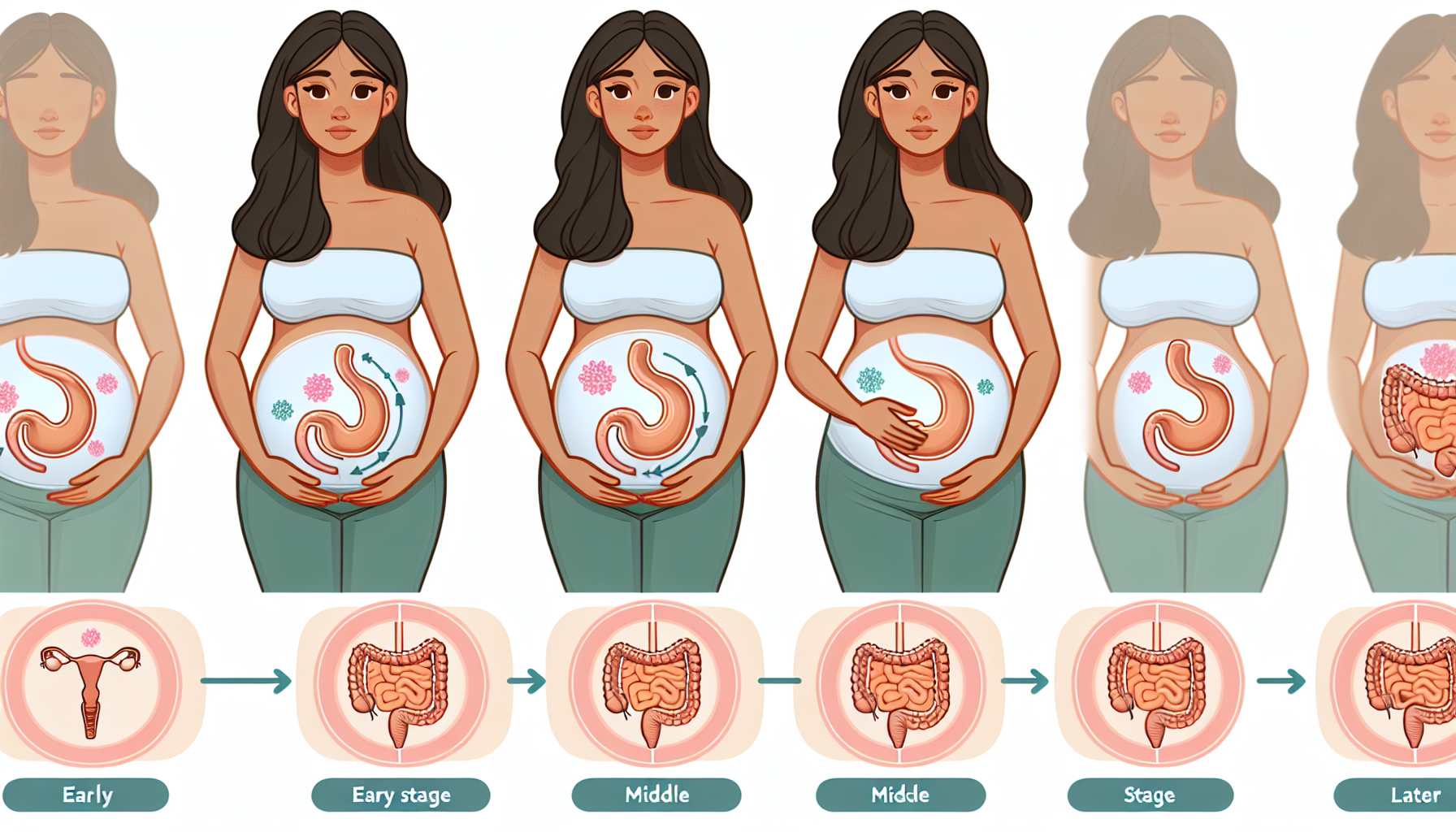Pregnancy is a time of profound change for a woman’s body, encompassing a variety of physical and hormonal adjustments. One area that is significantly affected during pregnancy is the digestive system. Understanding the shifts and knowing what to expect can help in managing discomfort and maintaining both maternal and fetal health.
The Digestive Shifts in Pregnancy
The digestive system undergoes several changes during pregnancy due to hormonal fluctuations and physical displacement by the growing uterus. One of the primary hormones affecting digestive processes is progesterone, which slows down the movement of food through the intestines to increase nutrient absorption. While beneficial for the baby, this can lead to common digestive complaints such as constipation or indigestion.
Constipation and Hemorrhoids
Constipation is a frequent issue due to the relaxed muscles in the bowel, and the pressure of the expanding uterus. This can also lead to the development of hemorrhoids. To alleviate constipation, pregnant women are advised to include plenty of fiber in their diet, stay hydrated, and engage in regular physical activity.
Heartburn and Reflux
As the uterus grows, it can push the stomach upwards, exacerbating heartburn and acid reflux. Eating smaller, more frequent meals and avoiding foods that trigger heartburn can help. Over-the-counter antacids may be used, but it’s important to consult with a healthcare provider before taking any medication during pregnancy.
Nausea and Vomiting
Morning sickness, which can actually occur at any time of day, affects a large number of pregnant women. While the exact cause is unknown, it is believed to be linked to increased levels of hormones, including human chorionic gonadotropin (hCG). It typically resolves by the second trimester.
Nutritional Considerations for Digestive Health
During pregnancy, the need for certain nutrients increases to support the growing fetus. Iron, folic acid, and calcium are particularly important. Women should eat a well-balanced diet and may need to take prenatal vitamins to ensure they are getting enough of these vital nutrients.
The Role of Prenatal Vitamins
Prenatal vitamins are crucial for filling any nutritional gaps and supporting the baby’s development. These typically contain folic acid, iron, calcium, and DHA among other vitamins and minerals. For more information on the importance of prenatal vitamins and supplements, visit Medication & Supplements.
The Importance of Hydration
Hydration is key to maintaining good digestive health. Water helps to dissolve nutrients and fiber, making it easier for them to pass through the intestines. Pregnant women should aim to drink at least eight to ten glasses of water a day.
Managing Digestive Health During Pregnancy
To manage the various digestive changes during pregnancy, women should focus on diet, exercise, and lifestyle adjustments. Incorporating foods rich in fiber can help maintain bowel regularity. Good sources include fruits, vegetables, whole grains, and legumes. Regular physical activity can also help keep the digestive system moving.
For a deeper understanding of the importance of dietary fiber in pregnancy, read the article on Dietary Fiber and Digestive Health: The Undeniable Link.
Mindful Eating
Eating mindfully can aid digestion and help prevent overeating, which can lead to discomfort. Taking time to chew food thoroughly and eating without distractions can improve digestive efficiency.
Probiotics and Gut Health
Probiotics can be beneficial in maintaining a healthy gut microbiome, which can be altered during pregnancy. Foods like yogurt, kefir, and fermented vegetables can be natural sources of probiotics. Alternatively, probiotic supplements can be considered after consulting with a healthcare provider.
External Support and Resources
When it comes to managing digestive health during pregnancy, external resources can be highly beneficial. Here are a few niche resources that provide specific guidance and support:
- American Pregnancy Association – Offers information on pregnancy health, complications, and nutrition.
- International Foundation for Gastrointestinal Disorders – Provides insights on managing digestive disorders during pregnancy.
- March of Dimes – Focuses on the health of mothers and babies, including nutrition and digestive health during pregnancy.
Each of these resources offers unique and detailed information that can assist pregnant women in navigating the complexities of digestive health.
Looking Ahead: Postpartum Digestive Health
After delivery, a woman’s body starts to return to its pre-pregnancy state, but it can take time for the digestive system to regulate. Issues like constipation and hemorrhoids may persist for a while postpartum. Continued attention to diet and hydration, along with gradual reintroduction of physical activity, can aid the recovery process.
For more information on the journey of digestive health postpartum, explore the article on Strategies for Managing IBS and Promoting Digestive Health.
Conclusion
Pregnancy is a dynamic period that brings about significant changes to a woman’s digestive system. By understanding these changes and how to manage them, pregnant women can maintain comfort and support the health of their developing baby. Nutritional considerations, mindful eating, and the appropriate use of supplements are all integral parts of this process.
For more comprehensive information and support on maintaining digestive health, visit Digestive Health. Here, you’ll find resources and guidance to navigate the digestive aspects of pregnancy and beyond, ensuring wellbeing for both mother and child.



